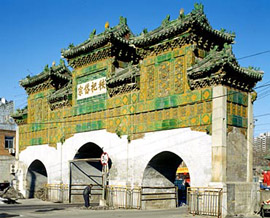 Dongyue Temple, long relegated to more practical uses than its original purpose as a Daoist temple, has completed RMB5.8 million ($707,307.-) worth of refurbishing. Built just before the Ming dynasty in 1319, it was actually during the Qing that many of the existing buildings were added. Only 500 meters east of Beijing's Chaoyangmen subway station, the temple is the largest in north China of the Zhengyi school of Daoism. For decades, however, it was home to hundreds of Beijing residents, government offices and a school.
Dongyue Temple, long relegated to more practical uses than its original purpose as a Daoist temple, has completed RMB5.8 million ($707,307.-) worth of refurbishing. Built just before the Ming dynasty in 1319, it was actually during the Qing that many of the existing buildings were added. Only 500 meters east of Beijing's Chaoyangmen subway station, the temple is the largest in north China of the Zhengyi school of Daoism. For decades, however, it was home to hundreds of Beijing residents, government offices and a school.
On the south side of Chaoyangmenwai of the temple gate stands a magnificent green-and-yellow glazed arch of four columns. Erected in 1607, the gate is comprised of three arches and is now the only remaining color-glazed arch in Beijing.
The temple was once famous for its statues of gods, couplets, stone tablets and its horizontal inscribed boards.
The temple once housed more than 3,000 statues, of which about 1,000 still remain. The Yude Hall, first finished in 1481, now displays the most valuable statues carved of jinsi nanmu, or golden-thread nanmu, including: the God of Heaven, God of Earth and the God of Water. Nanmu (southern wood) is a type of wood treasured for its resistance to decay. Art specialists confirmed in June 2002 that several of the statues in Yude Hall as well as three stone tablets in the courtyard are Chinese national treasures.
Of the more than 90 stone tablets still remaining in the temple, the most prized is one written in 1329 by Zhao Mengfu, one of the ?Four Calligraphers? of the Yuan dynasty. The four meters high tabletis inscribed on both sides with a total of 2,786 characters that describes the life of the Daoist master Zhang Liusun, the founder of Dongyue Temple.
Ticket: 10 yuan (US$1.2)
Tel: 65534437
Address: No.141 Chaowaidajie, Chaoyang Distrct, Beijing
Transportation: Take bus 112, 109, 101 and get off at Shenlujie station.
Open Time: 9:00-16:30
(china.org.cn April 16, 2003)
|

